- The University of Toronto: A History - Martin L. Friedland
- The Supreme Court on Trial: Judicial Activism or Democratic Dialogue - Kent Roach
- Between State and Market - Edited by Bruce Chapman, Jim Phillips, and David Stevens
- Indigenous Difference and the Constitution of Canada - Patrick Macklem
- Multicultural Jurisdictions: Cultural Differences and Women's Rights - Ayelet Shachar
- Law and Morality - Edited by David Dyzenhaus and Arthur Ripstein
- Judgment, Imagination and Politics: Themes from Kant and Arendt - Edited by Ronald Beiner and Jennifer Nedelsky
- The Theory of Contract Law: New Essays - Edited by Peter Benson
- Economic Shocks: Defining a Role for Government - Edward M. Iacobucci, Michael J. Trebilcock, Huma Haider
- Yearbook of International Environmental Law, Volume 11 - Editors-in-Chief Jutta Brunnée and Ellen Hey
- Northern Passage: American Vietnam War Resisters in Canada - John Hagan
- Security of Freedom: Essays on Canada's Anti-Terrorism Bill - Edited by Ronald J. Daniels, Patrick Macklem and Kent Roach
- International Health Care Reform: A Legal, Economic, and Political Analysis - Colleen M. Flood
- Barristers and Solicitors in Practice - General Editors, Justice Kenneth Lysyk and Lorne Sossin
- The Law of Independent Legal Advice - Ted Tjaden
The University of Toronto: A History
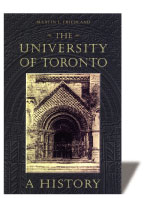
From its origin as King's College in 1827 to the present, Professor Martin Friedland weaves together personalities, events, and intellectual ideas to create a scholarly, yet highly readable history of the University of Toronto. The text describes the university's major figures such as Northrop Frye and Marshall McLuhan, and dramatic events such as the admission of women in the 1880s, the University College fire of 1890, the university's contributions during the First and Second World Wars, and the student protests of the 1960s. Friedland describes the university's history as intimately connected with events outside the scholastic community. Transitions in Canadian society such as that from the early dependence on Great Britain and fear of the United States, to the present dominance of American culture and ideas can be seen mirrored in the university. One can also trace the effects of the two World Wars, the Cold War, and the Vietnam War. As Canadian society and culture developed and changed through the latter half of the twentieth century, so too did the university: this university's history is the history of Canada and all Canadians.
Back to Top
The Supreme Court on Trial: Judicial Activism or Democratic Dialogue
(Short-listed for the 2001-2002 Donner Prize for best book on Canadian public policy)
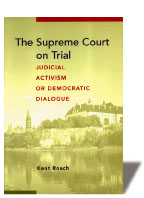 The Supreme Court of Canada has been accused of allowing criminals to go free; of permitting tobacco companies to advertise; of being too sympathetic to Aboriginal people; and of usurping democracy on abortion and gay rights. Some critics claim that the nine unelected judges on Canada's highest Court have used the Canadian Charter of Rights and Freedoms to impose their own views on public policy over those of elected governments. This book joins the crucial debate about the Charter, the Court, and Canadian democracy.
The Supreme Court of Canada has been accused of allowing criminals to go free; of permitting tobacco companies to advertise; of being too sympathetic to Aboriginal people; and of usurping democracy on abortion and gay rights. Some critics claim that the nine unelected judges on Canada's highest Court have used the Canadian Charter of Rights and Freedoms to impose their own views on public policy over those of elected governments. This book joins the crucial debate about the Charter, the Court, and Canadian democracy.
What is judicial activism? Is the Charter making us like America where the politics of the judges can determine the outcome of a national election? Can judges simply read their own political preferences into the Charter? Does the Court have the last word over democratically elected legislatures? Are our judges captives of special interests? What can Canadians and their governments do if they think the Court has got it wrong?
These are some of the questions that Professor Kent Roach considers in this important and timely book. In a clear, engaging, and thought-provoking manner, Roach strips away the rhetoric that has characterized much of the debate over judicial activism. As counsel who has appeared before the Court in several of its most important Charter cases, he provides unique insights into the work of the Court. As a leading professor of constitutional and criminal law, he offers an informed assessment of the Court's decisions and their impact on our legal and political system. In short, The Supreme Court on Trial makes an important contribution to understanding the role of the Court and the Charter in our democracy.
Back to Top
Between State and Market
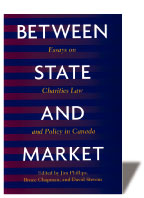
In this important contribution to the literature on charities law, the authors offer policy prescriptions for the future of an increasingly vital sector of Canadian society. The first section contains a sociological review of altruism in different societies, a discussion of altruism in various philosophical and religious traditions, an economic analysis of "rational voluntarism", and an assessment of the relationship between the charitable sector and the welfare state. The second section contains five papers on the legal definition of charity, both in general and particular. The third section deals with the tax status of charities and includes papers that evaluate the current tax credit system and the administration of charities by the Canada Customs and Revenue Agency. The final section contains essays on charities and commercial enterprise, on the regulation of fund-raising, and on needed reforms in non-profit corporation law.
Contributors include Neil Brooks (Osgoode Hall Law School), Cara Cameron (McGill), Bruce Chapman (Toronto), Kevin Davis (Toronto), Abraham Drassinower (Toronto), David Duff (Toronto), Richard Janda (McGill), Will Kymlicka (Queen's), Andrée Lajoie (Montreal), Mayo Moran (Toronto), Charles- Maxime Panaccio (office of Mr Justice Charles Gonthier), Jim Phillips (Toronto), Jane Allyn Piliavin (Wisconsin-Madison), David Sharpe (Attorney-General's Office, New York State), Lorne Sossin (Toronto), David Stevens, and Jen-Chieh Ting (Academia Sinica).
Back to Top
Indigenous Difference and the Constitution of Canada
(Winner of the 2002 Donald Smiley Prize for best book on Canadian government by the Canadian Political Science Association.)
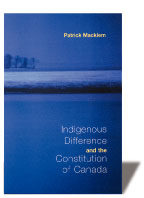 There is a unique constitutional relationship between Aboriginal people and the Canadian state. Why does this special relationship exist? What does it entail in terms of Canadian constitutional order? There are, Macklem argues, four complex social facts that lie at the heart of the relationship. First, Aboriginal people belong to distinctive cultures that were and continue to be threatened by non-Aboriginal beliefs, philosophies, and ways of life. Second, prior to European contact, Aboriginal people lived in and occupied North America. Third, prior to European contact, Aboriginal people exercised sovereign authority over persons and territory in North America. Fourth, Aboriginal people participated in and continue to participate in a treaty process with the Crown. Together, these four social conditions are exclusive to the Aboriginal people of North America and constitute what Macklem refers to as indigenous difference. This book details constitutional rights of Aboriginal people that protect culture, territory, sovereignty, and the treaty process, and explores the circumstances in which these rights can be interfered with by the Canadian state. It also examines the relation between these rights and the Canadian Charter of Rights and Feedoms, and proposes extensive reform of existing treaty processes in order to protect and promote their exercise.
There is a unique constitutional relationship between Aboriginal people and the Canadian state. Why does this special relationship exist? What does it entail in terms of Canadian constitutional order? There are, Macklem argues, four complex social facts that lie at the heart of the relationship. First, Aboriginal people belong to distinctive cultures that were and continue to be threatened by non-Aboriginal beliefs, philosophies, and ways of life. Second, prior to European contact, Aboriginal people lived in and occupied North America. Third, prior to European contact, Aboriginal people exercised sovereign authority over persons and territory in North America. Fourth, Aboriginal people participated in and continue to participate in a treaty process with the Crown. Together, these four social conditions are exclusive to the Aboriginal people of North America and constitute what Macklem refers to as indigenous difference. This book details constitutional rights of Aboriginal people that protect culture, territory, sovereignty, and the treaty process, and explores the circumstances in which these rights can be interfered with by the Canadian state. It also examines the relation between these rights and the Canadian Charter of Rights and Feedoms, and proposes extensive reform of existing treaty processes in order to protect and promote their exercise.
Back to Top
Multicultural Jurisdictions: Cultural Differences and Women's Rights
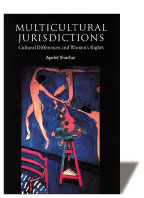 Is it possible for the state simultaneously to respect deep cultural differences and to protect the hard-won citizenship rights of vulnerable group members, in particular women? This book argues that this is not only theoretically needed, but also institutionally feasible. Professor Shachar's fresh approach proceeds from an acknowledgement of the potentially negative effects of well-intentioned multicultural accommodation, which often forces the most vulnerable constituents of cultural groups into an impossible choice: either an allegiance to their culture, or an exercise of their rights. Rejecting prevalent normative and legal solutions to this "paradox of multicultural vulnerability", Multicultural Jurisdictions develops a powerful argument for enhancing the jurisdictional autonomy of religious and cultural minorities while at the same time providing viable legal-institutional solutions to the problem of sanctioned intra-group rights violations. This new "joint governance" approach is guided by an ambitiously innovative principle: one that strives for the reduction of injustice between minority groups and the wider society, together with the enhancement of justice within them. Shachar applies this new approach to contested social arenas, such as family law, immigration policy and criminal justice. She shows how individuals who view themselves as simultaneously belonging to more than one membership community and subject to more than one legal authority can be empowered by their multiple affiliations. Unique in its interdisciplinary and comparative approach, this book makes a timely intervention in current multiculturalist and feminist debates by offering an in-depth exploration of practical legal-institutional solutions to vital normative dilemmas that beset diverse societies around the globe.
Is it possible for the state simultaneously to respect deep cultural differences and to protect the hard-won citizenship rights of vulnerable group members, in particular women? This book argues that this is not only theoretically needed, but also institutionally feasible. Professor Shachar's fresh approach proceeds from an acknowledgement of the potentially negative effects of well-intentioned multicultural accommodation, which often forces the most vulnerable constituents of cultural groups into an impossible choice: either an allegiance to their culture, or an exercise of their rights. Rejecting prevalent normative and legal solutions to this "paradox of multicultural vulnerability", Multicultural Jurisdictions develops a powerful argument for enhancing the jurisdictional autonomy of religious and cultural minorities while at the same time providing viable legal-institutional solutions to the problem of sanctioned intra-group rights violations. This new "joint governance" approach is guided by an ambitiously innovative principle: one that strives for the reduction of injustice between minority groups and the wider society, together with the enhancement of justice within them. Shachar applies this new approach to contested social arenas, such as family law, immigration policy and criminal justice. She shows how individuals who view themselves as simultaneously belonging to more than one membership community and subject to more than one legal authority can be empowered by their multiple affiliations. Unique in its interdisciplinary and comparative approach, this book makes a timely intervention in current multiculturalist and feminist debates by offering an in-depth exploration of practical legal-institutional solutions to vital normative dilemmas that beset diverse societies around the globe.
Back to Top
Law and Morality
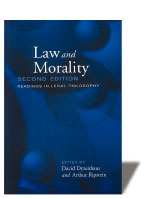 This anthology has filled a long-standing need for a contemporary Canadian textbook in the philosophy of law. It includes articles, readings, and cases in legal philosophy that give students the conceptual tools necessary to consider the general problems of jurisprudence. Beginning with general questions about morality and law, and drawing on both traditional literature on legal positivism and contemporary debates about the role of law as a tool in pursuit of equality, this book explores the tensions between law as a protector of individual liberty and as a tool of democratic self-rule. The second part deals with these philosophical questions as they apply to contemporary issues. Included is an extensive sampling of the feminist writings that have been influential in both legal theory and Canadian law. Transcripts of judicial decisions are presented throughout to give students an appropriate sense of the complexity of legal reasoning. This book strikes a balance between practical problems and the more analytic, philosophical frameworks. Its treatment of the philosophy of law as a branch of political philosophy enables students to understand law in its function as a social institution.
This anthology has filled a long-standing need for a contemporary Canadian textbook in the philosophy of law. It includes articles, readings, and cases in legal philosophy that give students the conceptual tools necessary to consider the general problems of jurisprudence. Beginning with general questions about morality and law, and drawing on both traditional literature on legal positivism and contemporary debates about the role of law as a tool in pursuit of equality, this book explores the tensions between law as a protector of individual liberty and as a tool of democratic self-rule. The second part deals with these philosophical questions as they apply to contemporary issues. Included is an extensive sampling of the feminist writings that have been influential in both legal theory and Canadian law. Transcripts of judicial decisions are presented throughout to give students an appropriate sense of the complexity of legal reasoning. This book strikes a balance between practical problems and the more analytic, philosophical frameworks. Its treatment of the philosophy of law as a branch of political philosophy enables students to understand law in its function as a social institution.
Back to Top
Judgment, Imagination and Politics: Themes from Kant and Arendt
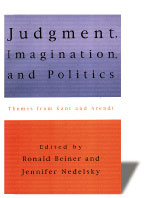 This book brings together for the first time leading essays on the nature of judgment. Drawing from themes in Kant's Critique of Judgment and Hannah Arendt's discussion of judgment from Lectures on Kant's Political Philosophy, these essays deal with: the role of imagination in judgment; judgment as a distinct human faculty; the nature of judgment in law and politics; and the many puzzles that arise from the "enlarged mentality," the capacity to consider the perspectives of others that aren't in Kant treated as essential to judgment.
This book brings together for the first time leading essays on the nature of judgment. Drawing from themes in Kant's Critique of Judgment and Hannah Arendt's discussion of judgment from Lectures on Kant's Political Philosophy, these essays deal with: the role of imagination in judgment; judgment as a distinct human faculty; the nature of judgment in law and politics; and the many puzzles that arise from the "enlarged mentality," the capacity to consider the perspectives of others that aren't in Kant treated as essential to judgment.
Back to Top
The Theory of Contract Law: New Essays
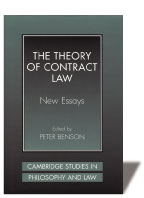 Although the law of contract is largely settled, there is at present no widely-accepted comprehensive theory of its main principles and doctrines or of its normative basis. Contract law theory raises issues concerning the relation between law and morality, the role and the importance of rights, the connection between justice and economics, and the distinction between private and public law. This collection of six full-length and original essays, written by some of the most eminent scholars in the field, explores the general theory of contract law from a variety of theoretical perspectives, and addresses a wide range of issues, both methodological and substantive. While the essays build upon past theoretical contributions, they also attempt to take contract theory further and suggest new and promising ways to develop theory of contract law. The Theory of Contract Law represents an ambitious attempt to advance the general theory of contract law. It will be of interest to professionals and students of law and philosophy.
Although the law of contract is largely settled, there is at present no widely-accepted comprehensive theory of its main principles and doctrines or of its normative basis. Contract law theory raises issues concerning the relation between law and morality, the role and the importance of rights, the connection between justice and economics, and the distinction between private and public law. This collection of six full-length and original essays, written by some of the most eminent scholars in the field, explores the general theory of contract law from a variety of theoretical perspectives, and addresses a wide range of issues, both methodological and substantive. While the essays build upon past theoretical contributions, they also attempt to take contract theory further and suggest new and promising ways to develop theory of contract law. The Theory of Contract Law represents an ambitious attempt to advance the general theory of contract law. It will be of interest to professionals and students of law and philosophy.
Back to Top
Economic Shocks: Defining a Role for Government
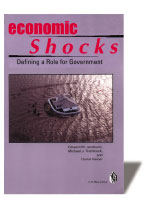 The objective of this book is to ascertain the appropriate role for government in responding to economic shocks. Analysis reveals three sources of economic shock: nature, the market, and government. Natural disasters such as floods, earthquakes, and droughts, can lead to extreme economic hardship for an entire region while domestic and international markets can contribute to economic shocks in a variety of ways, such as shifts in supply resulting from a change in technology. The final category of shock can arise when a change in government policy or government mismanagement harms a sector of the economy. This text embarks on four main avenues of inquiry. First, it develops a taxonomy of shocks according to their source. Second, it outlines a variety of normative rationales that may, depending on the circumstances, justify some form of government intervention in response to a shock. Third, it describes the policy tools that are available to governments considering intervention. Finally, it presents five case studies of shocks and governmental responses. The conclusion draws on the theoretical and empirical discussion to offer some lessons for policymakers.
The objective of this book is to ascertain the appropriate role for government in responding to economic shocks. Analysis reveals three sources of economic shock: nature, the market, and government. Natural disasters such as floods, earthquakes, and droughts, can lead to extreme economic hardship for an entire region while domestic and international markets can contribute to economic shocks in a variety of ways, such as shifts in supply resulting from a change in technology. The final category of shock can arise when a change in government policy or government mismanagement harms a sector of the economy. This text embarks on four main avenues of inquiry. First, it develops a taxonomy of shocks according to their source. Second, it outlines a variety of normative rationales that may, depending on the circumstances, justify some form of government intervention in response to a shock. Third, it describes the policy tools that are available to governments considering intervention. Finally, it presents five case studies of shocks and governmental responses. The conclusion draws on the theoretical and empirical discussion to offer some lessons for policymakers.
Back to Top
Yearbook of International Environmental Law, Volume 11
Editors-in-Chief Jutta Brunnée and Ellen Hey
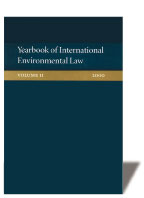 This leading scholarly publication in the field of international environmental law contains articles by leading authorities, a "symposium" of shorter essays on a key case or development, a "Year-in-Review" section providing over 100 reports on key developments contributed by expert scholars or practitioners, a book review section, and a bibliography. The Yearbook has an international editorial team and, until July 2001, was led by Professor Jutta Brunnée (University of Toronto) and Ellen Hey (Erasmus University Rotterdam) as Editors-in-Chief. The team of Associate Editors comprised Laurence Boisson de Chazournes (University of Geneva), Jeffrey Dunoff (Temple University School of Law), Naomi Roht-Arriaza (Hastings College of Law, University of California), and Farhana Yamin (Foundation for International Environmental Law and Development). Jonas Ebbesson (Stockholm University) is the Book Review Editor and Kenneth Rudolf (Yale Law School) is the Bibliography Editor.
This leading scholarly publication in the field of international environmental law contains articles by leading authorities, a "symposium" of shorter essays on a key case or development, a "Year-in-Review" section providing over 100 reports on key developments contributed by expert scholars or practitioners, a book review section, and a bibliography. The Yearbook has an international editorial team and, until July 2001, was led by Professor Jutta Brunnée (University of Toronto) and Ellen Hey (Erasmus University Rotterdam) as Editors-in-Chief. The team of Associate Editors comprised Laurence Boisson de Chazournes (University of Geneva), Jeffrey Dunoff (Temple University School of Law), Naomi Roht-Arriaza (Hastings College of Law, University of California), and Farhana Yamin (Foundation for International Environmental Law and Development). Jonas Ebbesson (Stockholm University) is the Book Review Editor and Kenneth Rudolf (Yale Law School) is the Bibliography Editor.
Back to Top
Northern Passage: American Vietnam War Resisters in Canada
John Hagan
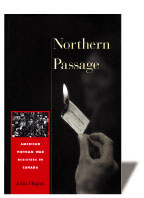 More than 50,000 draft-age American men and women migrated to Canada during the Vietnam War, the largest political exodus from the United States since the American Revolution. How are we to understand this migration three decades later? To write this book, Professor Hagan, himself a member of the exodus, searched declassified government files, consulted previously unopened resistance organization archives and contemporary oral histories, and interviewed American war resisters settled in Toronto to learn how they made the momentous decision. Canadian immigration officials at first blocked the entry of some resisters but under pressure from Canadian church and civil liberties groups, they fully opened the border, providing the legal opportunity to oppose the Vietnam draft and military mobilization while beginning new lives in Canada. It was a turning point for Canada as well, an assertion of sovereignty in its post-World War II relationship with the United States. For these Americans, the move was an intense and transformative experience. Some struggled for a comprehensive amnesty in the United States, others dedicated their lives to engagement with social and political issues in Canada. More than half of the resisters who fled 30 years ago remain today. Most lead successful lives, have lost their sense of Americanness, and overwhelmingly identify themselves as Canadians.
More than 50,000 draft-age American men and women migrated to Canada during the Vietnam War, the largest political exodus from the United States since the American Revolution. How are we to understand this migration three decades later? To write this book, Professor Hagan, himself a member of the exodus, searched declassified government files, consulted previously unopened resistance organization archives and contemporary oral histories, and interviewed American war resisters settled in Toronto to learn how they made the momentous decision. Canadian immigration officials at first blocked the entry of some resisters but under pressure from Canadian church and civil liberties groups, they fully opened the border, providing the legal opportunity to oppose the Vietnam draft and military mobilization while beginning new lives in Canada. It was a turning point for Canada as well, an assertion of sovereignty in its post-World War II relationship with the United States. For these Americans, the move was an intense and transformative experience. Some struggled for a comprehensive amnesty in the United States, others dedicated their lives to engagement with social and political issues in Canada. More than half of the resisters who fled 30 years ago remain today. Most lead successful lives, have lost their sense of Americanness, and overwhelmingly identify themselves as Canadians.
Back to Top
Security of Freedom: Essays on Canada's Anti-Terrorism Bill
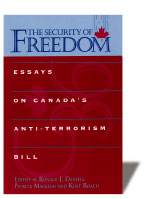 The ramifications of terrorist attacks on North American soil in 2001 sparked intense debate about governmental policies aimed at protecting Canadian citizens. At the time, the Canadian government's proposed anti-terrorism legislation, Bill C-36, contemplated dramatic changes to this country's laws, in areas as diverse as criminal procedure, international relations, immigration, individual privacy, law enforcement, and charitable giving. In this collection, Canada's leading scholars in the areas of law and public policy - many from the University of Toronto Faculty of Law - address the potential impact of these changes on the rights and freedoms that Canadians enjoy. The book is based on papers presented at a conference organized by the Faculty just two months after terrorist attacks in the United States rocked the world. The essays in this book provide a permanent record of the vital legal debate surrounding Bill C-36.
The ramifications of terrorist attacks on North American soil in 2001 sparked intense debate about governmental policies aimed at protecting Canadian citizens. At the time, the Canadian government's proposed anti-terrorism legislation, Bill C-36, contemplated dramatic changes to this country's laws, in areas as diverse as criminal procedure, international relations, immigration, individual privacy, law enforcement, and charitable giving. In this collection, Canada's leading scholars in the areas of law and public policy - many from the University of Toronto Faculty of Law - address the potential impact of these changes on the rights and freedoms that Canadians enjoy. The book is based on papers presented at a conference organized by the Faculty just two months after terrorist attacks in the United States rocked the world. The essays in this book provide a permanent record of the vital legal debate surrounding Bill C-36.
Back to Top
International Health Care Reform: A Legal, Economic, and Political Analysis
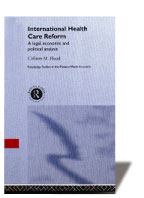 This work examines the two models of health care reform - managed competition and internal markets - that are increasingly becoming the dominant paradigm in European and North American policy. Considering the experience of reform in Canada, the U.S., the U.K., the Netherlands and New Zealand, Flood analyzes which reform model is likely to efficiently ensure access for all citizens to a comprehensive range of services, and draws out the implications for policy.
This work examines the two models of health care reform - managed competition and internal markets - that are increasingly becoming the dominant paradigm in European and North American policy. Considering the experience of reform in Canada, the U.S., the U.K., the Netherlands and New Zealand, Flood analyzes which reform model is likely to efficiently ensure access for all citizens to a comprehensive range of services, and draws out the implications for policy.
Chapters cover such topics as arguments in economics and justice for government intervention in health service markets; reform of health care systems in different countries; accountability of health care purchasers; the problems of monopoly supply; and improving health care quality while encouraging competition.
Back to Top
Barristers and Solicitors in Practice
General Editors, Justice Kenneth Lysyk and Lorne Sossin
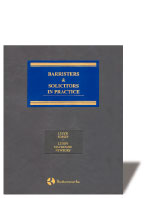 This text is intended to be a comprehensive reference source for the rules, statutes and case law that govern all aspects of the practice of law in the common law jurisdictions of Canada. Its aim is to enable a practitioner anywhere in the country to get quick and detailed answers to any questions about the structure and organization of the legal profession, the responsibilities and obligations of lawyers in carrying on the practice of law, and the dangers they may face in the course of doing so. The initial chapters deal with the organization of the profession, becoming a lawyer and setting up shop, and the other half of the book deals with the pitfalls of practice. Each chapter is prepared by an expert in the relevant field and Canadian lawyers can turn to it for advice on billing and remuneration, structuring the retainer, withdrawing from a file, receiving and accepting client instructions, establishing a partnership structure, advertising and competition among lawyers, confidentiality and conflict of interest, and professional conduct of judges and lawyers.
This text is intended to be a comprehensive reference source for the rules, statutes and case law that govern all aspects of the practice of law in the common law jurisdictions of Canada. Its aim is to enable a practitioner anywhere in the country to get quick and detailed answers to any questions about the structure and organization of the legal profession, the responsibilities and obligations of lawyers in carrying on the practice of law, and the dangers they may face in the course of doing so. The initial chapters deal with the organization of the profession, becoming a lawyer and setting up shop, and the other half of the book deals with the pitfalls of practice. Each chapter is prepared by an expert in the relevant field and Canadian lawyers can turn to it for advice on billing and remuneration, structuring the retainer, withdrawing from a file, receiving and accepting client instructions, establishing a partnership structure, advertising and competition among lawyers, confidentiality and conflict of interest, and professional conduct of judges and lawyers.
Back to Top
The Law of Independent Legal Advice
Ted Tjaden
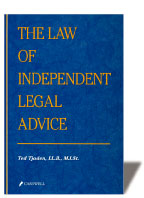 This book presents a comprehensive overview of the law governing lawyers when they provide (or fail to provide) independent legal advice to clients. Providing one-stop shopping for lawyers, judges and law students, it contains a review of all relevant Canadian case law and commentary on independent legal advice in a number of areas, including bank guarantees, family law, employment law, corporate law and insurance law. Also included is discussion of the professional and ethical responsibilities lawyers face and the risk of negligence claims for failing to provide independent legal advice or providing it incompetently. In addition to providing a thorough review of all relevant case law, the book also puts the law of independent legal advice in context by analyzing the factors that courts consider to determine when independent legal advice is warranted for a particular transaction.
This book presents a comprehensive overview of the law governing lawyers when they provide (or fail to provide) independent legal advice to clients. Providing one-stop shopping for lawyers, judges and law students, it contains a review of all relevant Canadian case law and commentary on independent legal advice in a number of areas, including bank guarantees, family law, employment law, corporate law and insurance law. Also included is discussion of the professional and ethical responsibilities lawyers face and the risk of negligence claims for failing to provide independent legal advice or providing it incompetently. In addition to providing a thorough review of all relevant case law, the book also puts the law of independent legal advice in context by analyzing the factors that courts consider to determine when independent legal advice is warranted for a particular transaction.
Back to Top


 The Supreme Court of Canada has been accused of allowing criminals to go free; of permitting tobacco companies to advertise; of being too sympathetic to Aboriginal people; and of usurping democracy on abortion and gay rights. Some critics claim that the nine unelected judges on Canada's highest Court have used the Canadian Charter of Rights and Freedoms to impose their own views on public policy over those of elected governments. This book joins the crucial debate about the Charter, the Court, and Canadian democracy.
The Supreme Court of Canada has been accused of allowing criminals to go free; of permitting tobacco companies to advertise; of being too sympathetic to Aboriginal people; and of usurping democracy on abortion and gay rights. Some critics claim that the nine unelected judges on Canada's highest Court have used the Canadian Charter of Rights and Freedoms to impose their own views on public policy over those of elected governments. This book joins the crucial debate about the Charter, the Court, and Canadian democracy.
 There is a unique constitutional relationship between Aboriginal people and the Canadian state. Why does this special relationship exist? What does it entail in terms of Canadian constitutional order? There are, Macklem argues, four complex social facts that lie at the heart of the relationship. First, Aboriginal people belong to distinctive cultures that were and continue to be threatened by non-Aboriginal beliefs, philosophies, and ways of life. Second, prior to European contact, Aboriginal people lived in and occupied North America. Third, prior to European contact, Aboriginal people exercised sovereign authority over persons and territory in North America. Fourth, Aboriginal people participated in and continue to participate in a treaty process with the Crown. Together, these four social conditions are exclusive to the Aboriginal people of North America and constitute what Macklem refers to as indigenous difference. This book details constitutional rights of Aboriginal people that protect culture, territory, sovereignty, and the treaty process, and explores the circumstances in which these rights can be interfered with by the Canadian state. It also examines the relation between these rights and the Canadian Charter of Rights and Feedoms, and proposes extensive reform of existing treaty processes in order to protect and promote their exercise.
There is a unique constitutional relationship between Aboriginal people and the Canadian state. Why does this special relationship exist? What does it entail in terms of Canadian constitutional order? There are, Macklem argues, four complex social facts that lie at the heart of the relationship. First, Aboriginal people belong to distinctive cultures that were and continue to be threatened by non-Aboriginal beliefs, philosophies, and ways of life. Second, prior to European contact, Aboriginal people lived in and occupied North America. Third, prior to European contact, Aboriginal people exercised sovereign authority over persons and territory in North America. Fourth, Aboriginal people participated in and continue to participate in a treaty process with the Crown. Together, these four social conditions are exclusive to the Aboriginal people of North America and constitute what Macklem refers to as indigenous difference. This book details constitutional rights of Aboriginal people that protect culture, territory, sovereignty, and the treaty process, and explores the circumstances in which these rights can be interfered with by the Canadian state. It also examines the relation between these rights and the Canadian Charter of Rights and Feedoms, and proposes extensive reform of existing treaty processes in order to protect and promote their exercise.  Is it possible for the state simultaneously to respect deep cultural differences and to protect the hard-won citizenship rights of vulnerable group members, in particular women? This book argues that this is not only theoretically needed, but also institutionally feasible. Professor Shachar's fresh approach proceeds from an acknowledgement of the potentially negative effects of well-intentioned multicultural accommodation, which often forces the most vulnerable constituents of cultural groups into an impossible choice: either an allegiance to their culture, or an exercise of their rights. Rejecting prevalent normative and legal solutions to this "paradox of multicultural vulnerability", Multicultural Jurisdictions develops a powerful argument for enhancing the jurisdictional autonomy of religious and cultural minorities while at the same time providing viable legal-institutional solutions to the problem of sanctioned intra-group rights violations. This new "joint governance" approach is guided by an ambitiously innovative principle: one that strives for the reduction of injustice between minority groups and the wider society, together with the enhancement of justice within them. Shachar applies this new approach to contested social arenas, such as family law, immigration policy and criminal justice. She shows how individuals who view themselves as simultaneously belonging to more than one membership community and subject to more than one legal authority can be empowered by their multiple affiliations. Unique in its interdisciplinary and comparative approach, this book makes a timely intervention in current multiculturalist and feminist debates by offering an in-depth exploration of practical legal-institutional solutions to vital normative dilemmas that beset diverse societies around the globe.
Is it possible for the state simultaneously to respect deep cultural differences and to protect the hard-won citizenship rights of vulnerable group members, in particular women? This book argues that this is not only theoretically needed, but also institutionally feasible. Professor Shachar's fresh approach proceeds from an acknowledgement of the potentially negative effects of well-intentioned multicultural accommodation, which often forces the most vulnerable constituents of cultural groups into an impossible choice: either an allegiance to their culture, or an exercise of their rights. Rejecting prevalent normative and legal solutions to this "paradox of multicultural vulnerability", Multicultural Jurisdictions develops a powerful argument for enhancing the jurisdictional autonomy of religious and cultural minorities while at the same time providing viable legal-institutional solutions to the problem of sanctioned intra-group rights violations. This new "joint governance" approach is guided by an ambitiously innovative principle: one that strives for the reduction of injustice between minority groups and the wider society, together with the enhancement of justice within them. Shachar applies this new approach to contested social arenas, such as family law, immigration policy and criminal justice. She shows how individuals who view themselves as simultaneously belonging to more than one membership community and subject to more than one legal authority can be empowered by their multiple affiliations. Unique in its interdisciplinary and comparative approach, this book makes a timely intervention in current multiculturalist and feminist debates by offering an in-depth exploration of practical legal-institutional solutions to vital normative dilemmas that beset diverse societies around the globe.  This anthology has filled a long-standing need for a contemporary Canadian textbook in the philosophy of law. It includes articles, readings, and cases in legal philosophy that give students the conceptual tools necessary to consider the general problems of jurisprudence. Beginning with general questions about morality and law, and drawing on both traditional literature on legal positivism and contemporary debates about the role of law as a tool in pursuit of equality, this book explores the tensions between law as a protector of individual liberty and as a tool of democratic self-rule. The second part deals with these philosophical questions as they apply to contemporary issues. Included is an extensive sampling of the feminist writings that have been influential in both legal theory and Canadian law. Transcripts of judicial decisions are presented throughout to give students an appropriate sense of the complexity of legal reasoning. This book strikes a balance between practical problems and the more analytic, philosophical frameworks. Its treatment of the philosophy of law as a branch of political philosophy enables students to understand law in its function as a social institution.
This anthology has filled a long-standing need for a contemporary Canadian textbook in the philosophy of law. It includes articles, readings, and cases in legal philosophy that give students the conceptual tools necessary to consider the general problems of jurisprudence. Beginning with general questions about morality and law, and drawing on both traditional literature on legal positivism and contemporary debates about the role of law as a tool in pursuit of equality, this book explores the tensions between law as a protector of individual liberty and as a tool of democratic self-rule. The second part deals with these philosophical questions as they apply to contemporary issues. Included is an extensive sampling of the feminist writings that have been influential in both legal theory and Canadian law. Transcripts of judicial decisions are presented throughout to give students an appropriate sense of the complexity of legal reasoning. This book strikes a balance between practical problems and the more analytic, philosophical frameworks. Its treatment of the philosophy of law as a branch of political philosophy enables students to understand law in its function as a social institution.  This book brings together for the first time leading essays on the nature of judgment. Drawing from themes in Kant's Critique of Judgment and Hannah Arendt's discussion of judgment from Lectures on Kant's Political Philosophy, these essays deal with: the role of imagination in judgment; judgment as a distinct human faculty; the nature of judgment in law and politics; and the many puzzles that arise from the "enlarged mentality," the capacity to consider the perspectives of others that aren't in Kant treated as essential to judgment.
This book brings together for the first time leading essays on the nature of judgment. Drawing from themes in Kant's Critique of Judgment and Hannah Arendt's discussion of judgment from Lectures on Kant's Political Philosophy, these essays deal with: the role of imagination in judgment; judgment as a distinct human faculty; the nature of judgment in law and politics; and the many puzzles that arise from the "enlarged mentality," the capacity to consider the perspectives of others that aren't in Kant treated as essential to judgment.  Although the law of contract is largely settled, there is at present no widely-accepted comprehensive theory of its main principles and doctrines or of its normative basis. Contract law theory raises issues concerning the relation between law and morality, the role and the importance of rights, the connection between justice and economics, and the distinction between private and public law. This collection of six full-length and original essays, written by some of the most eminent scholars in the field, explores the general theory of contract law from a variety of theoretical perspectives, and addresses a wide range of issues, both methodological and substantive. While the essays build upon past theoretical contributions, they also attempt to take contract theory further and suggest new and promising ways to develop theory of contract law. The Theory of Contract Law represents an ambitious attempt to advance the general theory of contract law. It will be of interest to professionals and students of law and philosophy.
Although the law of contract is largely settled, there is at present no widely-accepted comprehensive theory of its main principles and doctrines or of its normative basis. Contract law theory raises issues concerning the relation between law and morality, the role and the importance of rights, the connection between justice and economics, and the distinction between private and public law. This collection of six full-length and original essays, written by some of the most eminent scholars in the field, explores the general theory of contract law from a variety of theoretical perspectives, and addresses a wide range of issues, both methodological and substantive. While the essays build upon past theoretical contributions, they also attempt to take contract theory further and suggest new and promising ways to develop theory of contract law. The Theory of Contract Law represents an ambitious attempt to advance the general theory of contract law. It will be of interest to professionals and students of law and philosophy.  The objective of this book is to ascertain the appropriate role for government in responding to economic shocks. Analysis reveals three sources of economic shock: nature, the market, and government. Natural disasters such as floods, earthquakes, and droughts, can lead to extreme economic hardship for an entire region while domestic and international markets can contribute to economic shocks in a variety of ways, such as shifts in supply resulting from a change in technology. The final category of shock can arise when a change in government policy or government mismanagement harms a sector of the economy. This text embarks on four main avenues of inquiry. First, it develops a taxonomy of shocks according to their source. Second, it outlines a variety of normative rationales that may, depending on the circumstances, justify some form of government intervention in response to a shock. Third, it describes the policy tools that are available to governments considering intervention. Finally, it presents five case studies of shocks and governmental responses. The conclusion draws on the theoretical and empirical discussion to offer some lessons for policymakers.
The objective of this book is to ascertain the appropriate role for government in responding to economic shocks. Analysis reveals three sources of economic shock: nature, the market, and government. Natural disasters such as floods, earthquakes, and droughts, can lead to extreme economic hardship for an entire region while domestic and international markets can contribute to economic shocks in a variety of ways, such as shifts in supply resulting from a change in technology. The final category of shock can arise when a change in government policy or government mismanagement harms a sector of the economy. This text embarks on four main avenues of inquiry. First, it develops a taxonomy of shocks according to their source. Second, it outlines a variety of normative rationales that may, depending on the circumstances, justify some form of government intervention in response to a shock. Third, it describes the policy tools that are available to governments considering intervention. Finally, it presents five case studies of shocks and governmental responses. The conclusion draws on the theoretical and empirical discussion to offer some lessons for policymakers.  This leading scholarly publication in the field of international environmental law contains articles by leading authorities, a "symposium" of shorter essays on a key case or development, a "Year-in-Review" section providing over 100 reports on key developments contributed by expert scholars or practitioners, a book review section, and a bibliography. The Yearbook has an international editorial team and, until July 2001, was led by Professor Jutta Brunnée (University of Toronto) and Ellen Hey (Erasmus University Rotterdam) as Editors-in-Chief. The team of Associate Editors comprised Laurence Boisson de Chazournes (University of Geneva), Jeffrey Dunoff (Temple University School of Law), Naomi Roht-Arriaza (Hastings College of Law, University of California), and Farhana Yamin (Foundation for International Environmental Law and Development). Jonas Ebbesson (Stockholm University) is the Book Review Editor and Kenneth Rudolf (Yale Law School) is the Bibliography Editor.
This leading scholarly publication in the field of international environmental law contains articles by leading authorities, a "symposium" of shorter essays on a key case or development, a "Year-in-Review" section providing over 100 reports on key developments contributed by expert scholars or practitioners, a book review section, and a bibliography. The Yearbook has an international editorial team and, until July 2001, was led by Professor Jutta Brunnée (University of Toronto) and Ellen Hey (Erasmus University Rotterdam) as Editors-in-Chief. The team of Associate Editors comprised Laurence Boisson de Chazournes (University of Geneva), Jeffrey Dunoff (Temple University School of Law), Naomi Roht-Arriaza (Hastings College of Law, University of California), and Farhana Yamin (Foundation for International Environmental Law and Development). Jonas Ebbesson (Stockholm University) is the Book Review Editor and Kenneth Rudolf (Yale Law School) is the Bibliography Editor.  More than 50,000 draft-age American men and women migrated to Canada during the Vietnam War, the largest political exodus from the United States since the American Revolution. How are we to understand this migration three decades later? To write this book, Professor Hagan, himself a member of the exodus, searched declassified government files, consulted previously unopened resistance organization archives and contemporary oral histories, and interviewed American war resisters settled in Toronto to learn how they made the momentous decision. Canadian immigration officials at first blocked the entry of some resisters but under pressure from Canadian church and civil liberties groups, they fully opened the border, providing the legal opportunity to oppose the Vietnam draft and military mobilization while beginning new lives in Canada. It was a turning point for Canada as well, an assertion of sovereignty in its post-World War II relationship with the United States. For these Americans, the move was an intense and transformative experience. Some struggled for a comprehensive amnesty in the United States, others dedicated their lives to engagement with social and political issues in Canada. More than half of the resisters who fled 30 years ago remain today. Most lead successful lives, have lost their sense of Americanness, and overwhelmingly identify themselves as Canadians.
More than 50,000 draft-age American men and women migrated to Canada during the Vietnam War, the largest political exodus from the United States since the American Revolution. How are we to understand this migration three decades later? To write this book, Professor Hagan, himself a member of the exodus, searched declassified government files, consulted previously unopened resistance organization archives and contemporary oral histories, and interviewed American war resisters settled in Toronto to learn how they made the momentous decision. Canadian immigration officials at first blocked the entry of some resisters but under pressure from Canadian church and civil liberties groups, they fully opened the border, providing the legal opportunity to oppose the Vietnam draft and military mobilization while beginning new lives in Canada. It was a turning point for Canada as well, an assertion of sovereignty in its post-World War II relationship with the United States. For these Americans, the move was an intense and transformative experience. Some struggled for a comprehensive amnesty in the United States, others dedicated their lives to engagement with social and political issues in Canada. More than half of the resisters who fled 30 years ago remain today. Most lead successful lives, have lost their sense of Americanness, and overwhelmingly identify themselves as Canadians.  The ramifications of terrorist attacks on North American soil in 2001 sparked intense debate about governmental policies aimed at protecting Canadian citizens. At the time, the Canadian government's proposed anti-terrorism legislation, Bill C-36, contemplated dramatic changes to this country's laws, in areas as diverse as criminal procedure, international relations, immigration, individual privacy, law enforcement, and charitable giving. In this collection, Canada's leading scholars in the areas of law and public policy - many from the University of Toronto Faculty of Law - address the potential impact of these changes on the rights and freedoms that Canadians enjoy. The book is based on papers presented at a conference organized by the Faculty just two months after terrorist attacks in the United States rocked the world. The essays in this book provide a permanent record of the vital legal debate surrounding Bill C-36.
The ramifications of terrorist attacks on North American soil in 2001 sparked intense debate about governmental policies aimed at protecting Canadian citizens. At the time, the Canadian government's proposed anti-terrorism legislation, Bill C-36, contemplated dramatic changes to this country's laws, in areas as diverse as criminal procedure, international relations, immigration, individual privacy, law enforcement, and charitable giving. In this collection, Canada's leading scholars in the areas of law and public policy - many from the University of Toronto Faculty of Law - address the potential impact of these changes on the rights and freedoms that Canadians enjoy. The book is based on papers presented at a conference organized by the Faculty just two months after terrorist attacks in the United States rocked the world. The essays in this book provide a permanent record of the vital legal debate surrounding Bill C-36.  This work examines the two models of health care reform - managed competition and internal markets - that are increasingly becoming the dominant paradigm in European and North American policy. Considering the experience of reform in Canada, the U.S., the U.K., the Netherlands and New Zealand, Flood analyzes which reform model is likely to efficiently ensure access for all citizens to a comprehensive range of services, and draws out the implications for policy.
This work examines the two models of health care reform - managed competition and internal markets - that are increasingly becoming the dominant paradigm in European and North American policy. Considering the experience of reform in Canada, the U.S., the U.K., the Netherlands and New Zealand, Flood analyzes which reform model is likely to efficiently ensure access for all citizens to a comprehensive range of services, and draws out the implications for policy. This text is intended to be a comprehensive reference source for the rules, statutes and case law that govern all aspects of the practice of law in the common law jurisdictions of Canada. Its aim is to enable a practitioner anywhere in the country to get quick and detailed answers to any questions about the structure and organization of the legal profession, the responsibilities and obligations of lawyers in carrying on the practice of law, and the dangers they may face in the course of doing so. The initial chapters deal with the organization of the profession, becoming a lawyer and setting up shop, and the other half of the book deals with the pitfalls of practice. Each chapter is prepared by an expert in the relevant field and Canadian lawyers can turn to it for advice on billing and remuneration, structuring the retainer, withdrawing from a file, receiving and accepting client instructions, establishing a partnership structure, advertising and competition among lawyers, confidentiality and conflict of interest, and professional conduct of judges and lawyers.
This text is intended to be a comprehensive reference source for the rules, statutes and case law that govern all aspects of the practice of law in the common law jurisdictions of Canada. Its aim is to enable a practitioner anywhere in the country to get quick and detailed answers to any questions about the structure and organization of the legal profession, the responsibilities and obligations of lawyers in carrying on the practice of law, and the dangers they may face in the course of doing so. The initial chapters deal with the organization of the profession, becoming a lawyer and setting up shop, and the other half of the book deals with the pitfalls of practice. Each chapter is prepared by an expert in the relevant field and Canadian lawyers can turn to it for advice on billing and remuneration, structuring the retainer, withdrawing from a file, receiving and accepting client instructions, establishing a partnership structure, advertising and competition among lawyers, confidentiality and conflict of interest, and professional conduct of judges and lawyers.  This book presents a comprehensive overview of the law governing lawyers when they provide (or fail to provide) independent legal advice to clients. Providing one-stop shopping for lawyers, judges and law students, it contains a review of all relevant Canadian case law and commentary on independent legal advice in a number of areas, including bank guarantees, family law, employment law, corporate law and insurance law. Also included is discussion of the professional and ethical responsibilities lawyers face and the risk of negligence claims for failing to provide independent legal advice or providing it incompetently. In addition to providing a thorough review of all relevant case law, the book also puts the law of independent legal advice in context by analyzing the factors that courts consider to determine when independent legal advice is warranted for a particular transaction.
This book presents a comprehensive overview of the law governing lawyers when they provide (or fail to provide) independent legal advice to clients. Providing one-stop shopping for lawyers, judges and law students, it contains a review of all relevant Canadian case law and commentary on independent legal advice in a number of areas, including bank guarantees, family law, employment law, corporate law and insurance law. Also included is discussion of the professional and ethical responsibilities lawyers face and the risk of negligence claims for failing to provide independent legal advice or providing it incompetently. In addition to providing a thorough review of all relevant case law, the book also puts the law of independent legal advice in context by analyzing the factors that courts consider to determine when independent legal advice is warranted for a particular transaction.